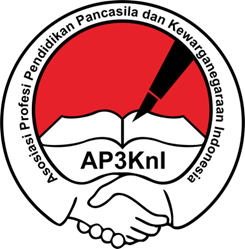Internalization Of Pancasila Values Based On School Culture
DOI: https://doi.org/10.26618/jed.v7i3.8107
, Internalization, Values, Pancasila, Culture
Abstract
Strengthening Pancasila values in schools can be carried out in a structured manner through school programs in order to become a habituation for the application of character values carried out by students in school cultural activities. Students who have the character of Pancasila values are the main basis for welcoming the golden generation in 2045. This research aims to analyze the Internalization of Pancasila Values Based on School Culture as well as analyze the impact of internalization of Pancasila values based on school culture in everyday life. This research method uses qualitative descriptive, while the data collection techniques in this study are observation, interview, FGD, and documentation. The data analysis techniques used are Miles and Huberman which include data collection, data reduction, presenting data, and drawing conclusions. Furthermore, the data is tested for validity with credibility, transferability, dependability, and confirmability. The results of this study include learning process activities that are integrated in all subjects. Internalization of the value of Pancasila as a form of local wisdom in cultural-based national insights has the character of nationalism, integrity and mutual cooperation, and has knowledge related to national insights and love of the homeland (WANGSACITA) judging from the supporting factors for the internalization of Pancasila values that are used as a school culture, so that students have a spirit of unity and unity in behaving in the midst of student diversity in school.
References
Adisusilo, S. (2012). Learning Character Values: Constructivism and VCT as Innovative Effective Learning Approaches. Jakarta: Rajawali Press.
Danniarti, R. (2017). Implementation of Pancasila Values as a Support for the Growth and Development of National Insights in PPKn Subjects at SMPN 7 Palembang. JMKSP: Journal of Education Management, Leadership, and Supervision, 2(2), 187-202.
Fusnika, D. K. (2018). The Value of Forming National Character in the Local Culture of Kee'rja Banyau. Scientific Journal of Pancasila and Civic Education, 3(2), 126-131.
Hendra, S.B, et al. (2018). Strengthening the National Insights of the Younger Generation through Tadarus Buku Activities. Journal of Civics: The Study of Citizenship, 15(2), 126 – 133.
Hendrizal. (2020). Reviewing the Latest National Identity of the Indonesian Nation. Journal of CIVICs & Law, 15 (1), 1-20.
Ihfa, F. (2020, March 1). Character Education and the Existence of the Younger Generation. Indonesian media. Retrieved from Media Indonesia: https://mediaindonesia.com/humaniora/356359/pendidikan-karakter-dan-eksistensi-generasi-muda.
Lestari, E.Y. J & Wardani, P.K. (2019). Growing Awareness of The Nationalism of the Younger Generation in the Era of Globalization through the Application of Pancasila Values. Adil Indonesia Journal, 1(1), 20-27.
Lickona, T. (2013). Character Education: A Complete Guide to Educating Students to Be Smart and Good. Bandung: Nusa Media.
Maimun, et al. (2020). Internalization of National Character Values through Cultural and Civic Literacy in Banda Aceh City High School (SMA). CIVICUS:Education-Research-Pancasila and Civic Education Service, 8 (1), 8-15.
Moh. Destiny, I. (2014). The Failure of Character Education: An Analysis and Solution of The Golden Character Control of Protégés. Yogyakarta: Ar-Ruzz Media.
Nasiwan & Cholisin . (2012). Basic basics of political science. Jakarta: Waves.
Nurfatimah, S. A & Dinie A. D. (2021). Implementation of Pancasila Values in Fostering National Insights in the Life of the Indonesian Nation. Indonesian Journal, 5(1), 176-183.
Nurgiansah, T. H. (2020). The Phenomenon of Online Prostitution In Yogyakarta City In The Effectiveness Of Just And Civilized Human Values. Journal of Citizenship, 17, (1), 27–34.
Octavia, E. & M. Anwar, R. (2017). Strengthening Pancasila-Based Character Education to Form PPKn Study Program Students to Become Good and Intelligent Citizens. Journal of Social Education, 4(1), 111-124.
Putri, M. A & Eko A.M. (2018). Is Pancasila and Globalization relevant? Uncovering the Relationship between Pancasila and Global Identity. Scientific Journal of Pancasila and Civic Education , 3(1), 74-80.
Rahmat, Wijayanto J.M. (2018). State Defense Education As A Milestone Of Civilization The Soul Of Patriotism Of The Younger Generation. Scientific Journal of Pancasila and Civic Education, 3(2), 186-191.
Rusdiyani, E. (2016, March 6). Character Building and Morality for the Younger Generation Guided by Pancasila Values and Local Wisdom. Retrieved from Scientific Publications of Muhammadiyah University of Surakarta: https://publikasiilmiah.ums.ac.id/handle/11617/10740?show=fullSamani.
M. & Hariyanto. (2012). Konsep dan Model Pendidikan Karakter. Bandung: PT. Remaja Rosdakarya.
S Setiawan, G. S. (2019). Ecological Citizenship Movement As An Effort For Environmental Care Characters Building. Scientific Journal of Pancasila and Civic Education, 4(2), 381-392.
Sisman, W. P & Ruslan, R. (2016). Civic Education Frame of the Republic of Indonesia. Jakarta: Media Discourse Partners.
Suryadi. (2013). Character Education Learning Strategies. Bandung: PT. Juvenile Rosdakarya.
Syarbaini, S. (2016). Citizenship Education for Higher Education: Implementation of National Character Values. Bogor: Ghalia Indonesia. Destiny, M. (2014). Educating Education. Malang: UMM Press.
Widisuseno, I. & Sri, S. (2019). Strengthening National Insights as an Effort to Prevent Radicalism and Intolerance Among Students of State High School 3 Salatiga Kotamadia Salatiga. Journal of HARMONY, 3(1), 24-28.
Zulkifli, Y. G & Febri S. (2021). Planting Entrepreneurial Values in Islamic Boarding Schools as an Implementation of Economic Civic. Civic Journal of Law, 6(2), 199-210.
Zuriah, N. (2021). Instillation of Pancasila Character Values in Polysynchronous-Based Civic Education Learning in the New Normal Era. Journal of Societal Morals, 6 (1), 12–25.



